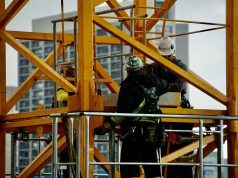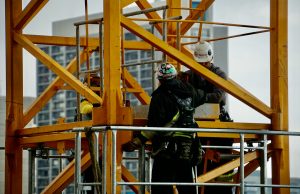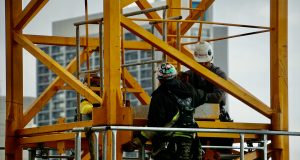Progress in the construction industry is often at the mercy of the elements, either through the environment or adverse weather. Construction sites can very quickly become quagmires, making it dangerously impossible for heavy plant machinery to operate effectively. However, the temporary use of road mats can create a stable, solid base where machinery can manoeuvre in safety, enabling construction deadlines to be met without unnecessary delays. Incredibly versatile, road mats can be used for a wide range of projects including pipe work, road construction and repair, demolition and building sites, bridge building and many other projects. They are particularly useful in difficult areas such as coastal regions or riverside locations. Some versions are ideal for creating walkways for pedestrians.
Simple But Effective
Road mats couldn’t be simpler to create from planks of sturdy timber which are laid to form a solid mat. Available in three and five metre lengths, dozens can be used to construct a mat of any size. Temporary mats can be laid in a very short time providing an ideal solution in emergencies where working conditions might suddenly deteriorate. Easy to stack and store, the mats require no special machinery for installation, making them extremely cost effective. The planks have two eyelets for easy manoeuvring and they do not need fixing as their own weight is substantial enough to keep them firmly in place.
High Quality Timbers
Reputable companies are all too aware of the ecological damage that can impact on vulnerable conservation areas and only use properly certified timbers from an authorised renewable source. One of the most popular timbers is the European Oak (quercus petraea). Forest Stewardship Council (FSC) endorsed oak is a heavy, dense timber that has a high resistance to crushing and bending with excellent capabilities of absorbing the shock of sudden loads. With a life span of 15-25 years, it is perfect for all forms of medium weight construction traffic. American White Oak (quercus alba) is a heavy wood certified by the Sustainable Forestry Initiative (SFI). With a medium resistance to crushing, it is usually available in thicker planks to form mats that are ideal for heavier construction purposes providing access for cranes and outrigger pads. The West African tree, Ekki (lophira alata) is also known by the name of Azobe. It is one of the most expensive timbers partly due to illegal industries increasing the price and because there is a limited availability from reliable sources. With a life span of 50 years it is extremely tough and performs well in soft, waterlogged ground.
Construction Suitability
Temporarily laid road mats are available in various thicknesses, from 70mm to 250mm and can withstand weights of up to 60 tonnes or more. Timbers of 250mm are particularly suitable for use where there is wet, unstable ground of peat or sand. Planks can also be laminated to provide a superior base for the heaviest of equipment in the poorest of conditions. When difficult terrain or weather conditions threaten the progress of a project, a temporary road mat provides the perfect solution. Ideal for all types of construction work, a road mat creates a safe, solid platform for large machinery. Quick and easy to install, convenient in storage, it is extremely versatile and cost effective.














